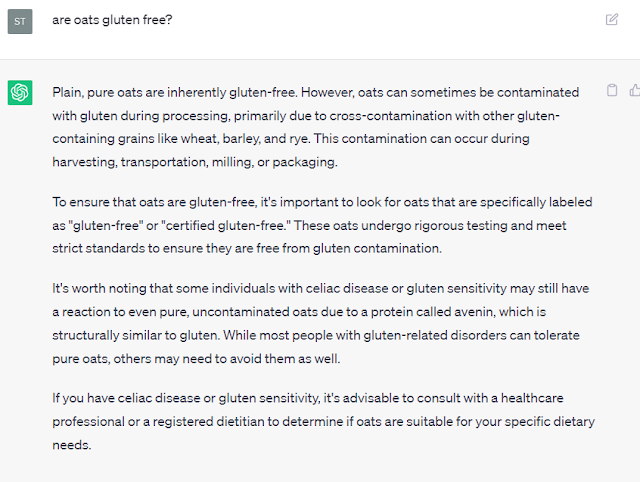Unless you have been living under a rock (one with no internet access) for the last 6 months, you will no doubt have heard of and tried ChatGPT.
It has some advantages, such as a spooky way of answering a question just like a really well-educated 'expert' - and some BIG disadvantages such as:
- It doesn't know about anything after September 2021
- You can't trust anything it says - it can totally make stuff up!
For instance, I asked ChatGPT if it could suggest some books on a certain topic and it gave me three recommendations. Great I thought, but then spent 30 minutes trying to find them! I even searched wiki and goodreads.com and couldn't find any of them.
This shows that depending on ChatGPT for accurate information can be a big mistake. For instance, nearly all grass-based grains contain 'glutens'. Each plant species contains a slightly different type of gluten protein (a gliadin). In oats it is called avenin, in wheat it is glutenin, in barley it is hordein, in rye it is called secalin. So the answer it gave to the question below was not correct. Oats are glutenin-free but not 'gluten-free' because 'gluten' is an umbrella term for a large class of proteins (some celiacs are affected by avenin).
So is glutenin is present in barley or not? The correct answer is 'No', glutenin is in wheat and hordeins are in barley, but it answered my question as 'Yes'! Like Google search, ChatGPT had mistaken the word 'glutenin' for 'gluten' - i.e. IT LIED TO ME !!!!!
Here is a result after using double-quotes around the word 'glutenin':
So it seems you must use double-quotes on key words when using ChatGPT or you may not get the correct answer, and even then you will need to double-check its answers carefully!
BUT - ChatGPT is great for one thing!
So what do I use ChatGPT for? Well, I mostly use it for general purpose 'how to' enquiries such as 'How to use xxxxx' or 'What can I use to do xxxxxx with a yyyyy' type enquiries.
For instance, I have recently started to use Microsoft Visual Code and PlatformIO to program an esp32 MiniWebRadio project which I have managed to get working.
I am not experienced in PlatformIO and although it is very powerful, it requires a steep learning curve. One problem I have with PlatformIO is that you don't know what a control or button will do until you actually click on it. For instance there is a button marked 'Clean' - now does this wipe all files from my project or what? It just assumes that I know that 'Clean' means 'Delete all object files so that cMake is forced to recompile all files the next time a build is run'. The PlatformIO designers just seem to assume that everyone knows what 'Clean' will do!
So here is an example of where PlatformIO becomes really useful. I wanted to know how to upload my project to GitHub, but I wasn't sure how this would work or how to do it. I tried using Google but after 10 minutes, I could see that this was going to take me an hour to trawl through the extensive documentation on the internet!
So I turned to ChatGPT and asked it:
'In PlatformIO , how do I upload my project to a new GitHub repository'
and it replied back with some command line instructions which were not going to be easy to remember, so I asked it:
'Can this be done using the PlatformIO GUI rather than the command line?'
and it replied 'Yes' and told me how!
One of the steps it told me to take was to select 'Initialize repository' - but I had no idea what that would do, so I simply asked it:
'what does 'initialize repository' in PlatformIO actually do?'
and it told me.
I had a few other questions, which it also answered.
The whole thing took me five minutes instead of an hour.
Similarly, asking it to provide code samples is also useful, although you usually need to ask it more questions such as 'can this handle large numbers?' or 'is there another way of doing this?', etc. just to be sure it has given you robust code. Often it will modify the code for you. You don't need to re-phrase the original question because it remembers all your previous questions in that same 'chat' session, so it knows the context. Just ask it as if you are having a chat with a human.
BUT ChatGPT is NOT intelligent! It is just returning 'internet' information and it has no idea if it's first answer (the first 'hit' result) is actually correct or not.
So do you think scientists and journalists should use ChatGPT? I certainly don't!




No comments:
Post a Comment